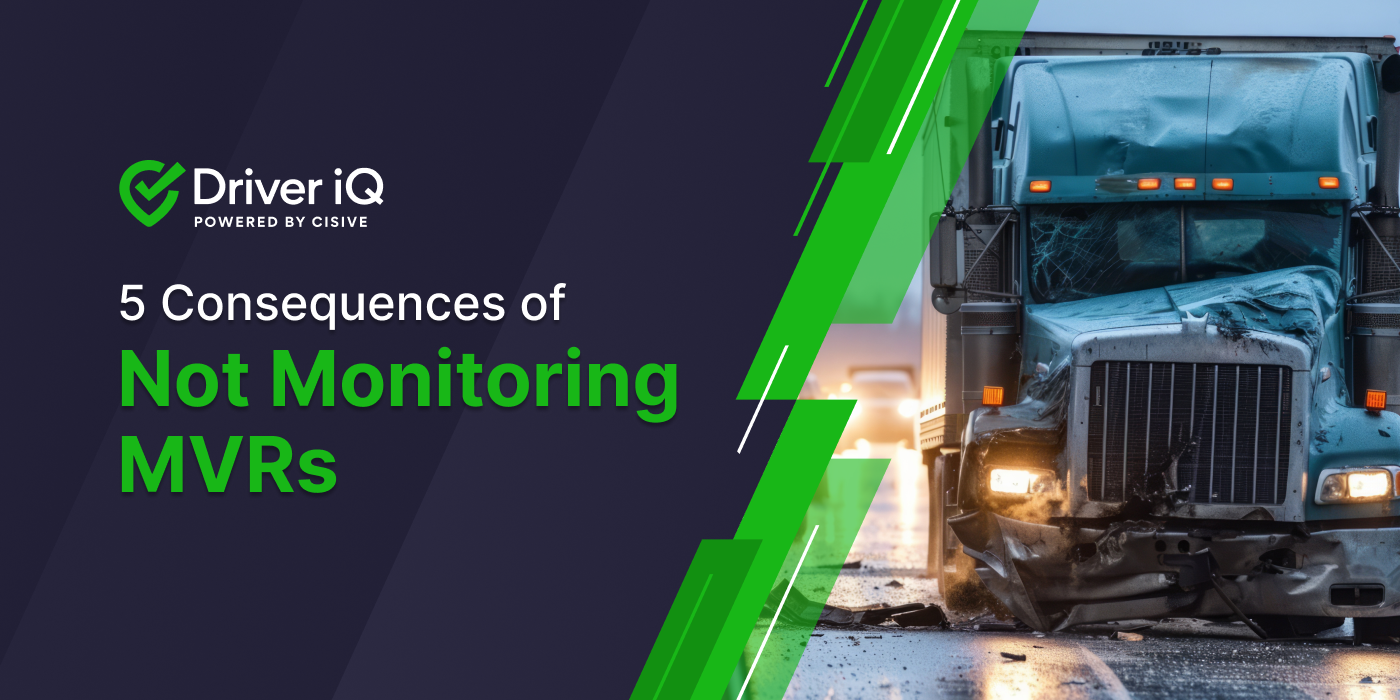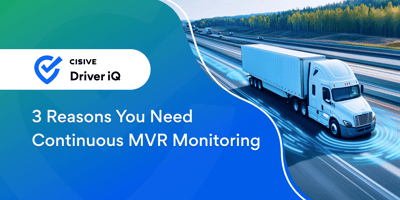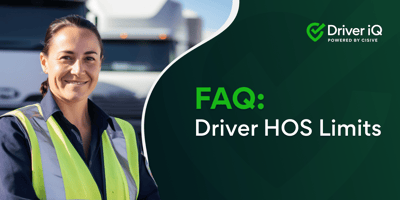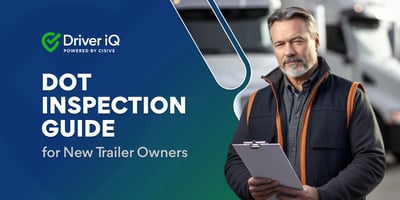

Keeping your fleet safe requires more than periodic checks. A real time MVR monitoring program...

Picture this: You hired a driver with a clean driving history, and he’s worked for you for over a decade.
One day, while operating your company vehicle, he injures someone in a collision. It then comes out that he’s had two DUIs in the past ten months and recently had his license suspended. Your company now faces a multi-million dollar lawsuit, forever damaging your brand reputation.
It might seem unthinkable that you wouldn’t know an employee had such a poor driving record, but it happens. Luckily, MVR monitoring can help prevent exactly this situation.
So, what is MVR monitoring? Motor vehicle record (MVR) monitoring is designed to inform employers about changes in drivers’ records as they occur. It updates you about traffic violations, license statuses, and if a serious driver infraction occurs.
If you want to improve safety, maintain compliance, and reduce liability, our guide tells you everything you need to know about MVR monitoring.
Key TakeawaysHere are the key things you need to know about MVR monitoring:
|
MVR monitoring is a digital service that tracks changes in employee driving records in real-time.
When there’s a change in an employee’s license, you receive instant alerts. The system informs you about both negative and positive changes in driving records. This includes violations, accidents, license suspensions, and other incidents. You also learn about license renewals and DOT medical card updates.
With MVR monitoring, you can quickly identify high-risk drivers and take appropriate action. You also maintain compliance, reduce liability, and improve overall fleet safety. You can spot dangerous driving patterns before they lead to serious incidents.
The Federal Motor Carrier Safety Administration (FMCSA) mandates annual MVR checks. However, a lot can happen in a year, and issues may arise that you’re not aware of until it’s too late.
A software service providing continuous MVR monitoring solves this problem by drawing from local or state driving records and delivering real-time updates. Let’s answer some common questions to see how it works.
The digital service tracks incidents and violations that alter a driver’s license status or driving record. While it does include positive updates, such as confirming that renewals are done on time, most employers are concerned about catching violations. Instant updates and alerts vary by state, but may include:
MVR monitoring is widely used across the trucking industry, from small local fleets to large national carriers. While the law mandates only annual checks, most trucking companies implement MVR monitoring to improve safety, stay compliant, and avoid risks.
MVR monitoring is especially common among medium to large carriers with 50 or more drivers. However, smaller companies with smaller fleets also utilize MVR monitoring services to protect their business and maintain high safety standards.
You can perform MVR monitoring manually. But remember that manual monitoring involves regularly requesting and reviewing MVRs from state DMVs. It’s time-consuming, and you’re likely to experience delays.
For this reason, most companies use automated solutions, most of which are fast and reliable. These MVR monitoring services use automated systems that interact with state DMV databases.
How does MVR monitoring work?
It’s that simple. However, the process involves setting up a secure data transmission. It also includes API integrations with state databases. The software uses sophisticated algorithms to analyze and categorize information.
The MVR monitoring process helps you quickly identify high-risk drivers within your organization. This allows for corrective action with drivers.
MVR information will primarily come from the driver’s state Department or Bureau of Motor Vehicles. States keep records of licenses, moving violations, and accidents. All this information is crucial to knowing whether your drivers are operating vehicles safely.
With continuous monitoring, software programs may also check the FMCSA drug and alcohol clearinghouse, which tracks violations for CDL holders. It may also refer to the DOT physical exam results for medical certification updates.
Do you want to see MVR monitoring in action? Here are three real-world examples of how the service can track driver’s licenses or driving records.
Example 1:
A trucking company implements MVR monitoring for its fleet of 100 drivers. The manager receives an alert that one driver got a speeding ticket. The company schedules a safety training session for the driver to prevent further violations or potential accidents.
Example 2:
A delivery service uses MVR monitoring for its couriers. The system flags a driver whose license was suspended due to unpaid parking tickets. The company reassigns the driver to non-driving duties. They help the driver resolve the issue and reinstate their license before allowing them back on the road.
Example 3:
A small trucking company employs MVR monitoring for its drivers. They receive an alert about a driver's recent DUI charge. The company immediately removes the driver from their route. They investigate the charge and take appropriate disciplinary action to ensure safety.

One of the long-term consequences of not monitoring your drivers is developing a reputation as a dangerous company. It can hurt your public image and potentially cause you to lose business.
Beyond the business aspect, there are several legal and logistical risks of not implementing a comprehensive, up-to-date MVR monitoring system.
An unmonitored driver is potentially a dangerous driver. A driver with a history of DUIs, reckless driving, or lack of training is a safety risk. They create unsafe road conditions for other drivers and pedestrians.
What if you discover a traffic violation in one state but fail to find it in another? Missing violations and incidents put your company in jeopardy of numerous consequences. Not knowing a driver’s record is an excuse that may not hold up in a criminal or civil case.
Without real-time updates on driver violations, you may unknowingly allow high-risk drivers to operate vehicles. Increased accidents, fines, and investigations can lower your company’s CSA scores and potentially downgrade your FMCSA safety ratings.
If you hire non-compliant or dangerous drivers, civil penalties can range from hundreds to tens of thousands of dollars per violation. You may face lawsuits or pay legal fees and stiff fines for any incident resulting from hiring unqualified drivers. There is also the risk of potential nuclear verdicts stemming from post-accident lawsuits.
An insurance company can raise your premiums significantly if it discovers that you’re hiring drivers with poor driving records. For example, hiring or keeping a driver with a DUI may raise your insurance costs by over $1,000 annually.

Receiving real-time updates on driver violations and incidents can help you identify high-risk drivers quickly. This lets you take action to reduce liability and potential legal issues, creating all kinds of advantages for your company.
MVR monitoring helps you save money by reducing insurance premiums and avoiding costly fines. You can take preventive measures to avoid accidents and violations that otherwise increase operating costs. You also have peace of mind knowing that all your driver information is up to date.
Example: A trucking company implements MVR monitoring and quickly identifies a driver with multiple recent speeding tickets. They enroll the driver in a safety course to prevent potential accidents. As a result, they save thousands in potential legal fees and damages.
With MVR monitoring, you identify risky behavior patterns before they lead to serious accidents. You can intervene with additional training or disciplinary actions to correct dangerous habits by tracking violations and incidents in real time.
Example: MVR monitoring alerts your company to a driver's recent DUI. Your company suspends the driver and provides mandatory substance abuse counseling. Doing so prevents a potential tragedy and protects your company from liability.
Real-time data helps you maintain compliance with FMCSA regulations and avoid penalties for outdated or incomplete records. Accurate records also streamline your operations and improve your decision-making.
Example: Your company uses MVR monitoring to automatically update driver qualification files. When a driver's medical certificate expires, the system immediately flags it. You take measures to suspend the driver or help them renew their certificate. Once the driver renews the certificate, the system automatically sends you an alert.
You receive immediate notifications about driver incidents. As a result, you can respond quickly and mitigate the consequences of the incident. Real-time information enables you to address issues promptly to prevent further violations or accidents.
Example: A driver receives a speeding ticket while on a long-haul trip. MVR sends you a notification. You contact the driver, assess the situation, and provide guidance. A quick response prevents further risky behavior and demonstrates how well you can manage an incident.
MVR monitoring helps you maintain your company's reputation by ensuring you have safe, compliant drivers on the road. You demonstrate your commitment to safety and responsible business practices by quickly addressing issues while preventing others. You build trust with employees, partners, customers, and the community.
Example: You use MVR monitoring to maintain a fleet of drivers with clean records. You feature the safety record in marketing materials. As a result, you attract safety-conscious clients, which gives you leverage to raise your rates. Your commitment to safety sets you apart and establishes you as a leader in the industry.
Services like Driver iQ deliver comprehensive MVR monitoring services to help you stay on top of driver records. They provide real-time alerts for license status changes, violations, and accidents. You receive immediate notifications so that you can take swift action on high-risk drivers.
Here are some real-world benefits of Driver iQ:
Whether you’re hiring new drivers or tracking current operators, the platform can help ensure you have a safe driving fleet. You can keep your insurance premiums low and protect your company’s reputation. You also maintain compliance to avoid fines and other penalties.
So, what is MVR monitoring? It's a process that protects you from unsafe drivers and risks that can impact your trucking business.
Driver iQ allows you to monitor employee licenses and driving records to maintain compliance and help keep everyone safe on the road. Fill out our online form to schedule a demo or speak to an expert about our MVR monitoring service.
Author: Michael Kapuschinsky
Bio: Product Manager with more than a decade of experience in the transportation industry.
Let's Connect on LinkedIn
Keeping your fleet safe requires more than periodic checks. A real time MVR monitoring program...

Millions of commercial truck drivers transport goods, materials, and equipment every day. These...

Owning and operating a new trailer can be an exciting experience. However, it’s important to...